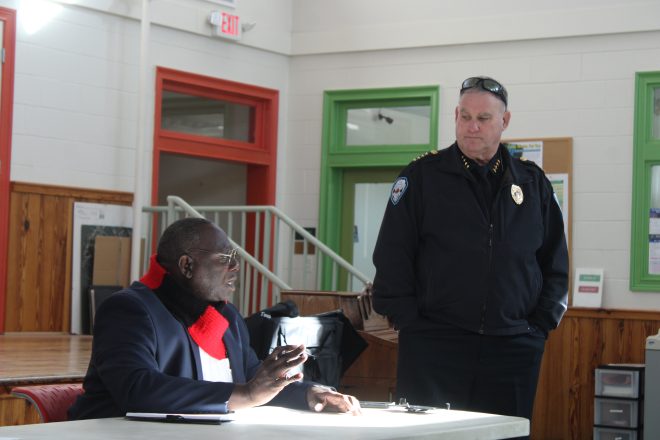Brown, Scott hosts Let’s Talk Thomasville event
Published 4:34 pm Monday, January 27, 2025

- WORKING TOGETHER FOR THE COMMUNITY: Councilman Terry Scott asks TPD Chief Wade Glover to provide additional officers in the MLK Drive area to curb speeding. (Jill Holloway/The Thomasville Times- Enterprise)
THOMASVILLE- District One City Councilmembers Lucinda Brown and Terry Scott held a Let’s Talk Thomasville public forum on Saturday, inviting members of the public to voice concerns and ask questions. Numerous residents attended the event, held at the Thomasville Community Resource Center, prompting responses on speeding, noise complaints, and blight from Brown, Scott, and the engineering department.
Councilmembers began by opening the floor for questions, encouraging open dialogue among officials and citizens.
The first question came from a young woman who wanted to tackle speeding issues, specifically on Martin Luther King Dr. between Campbell and Jackson St.
“There is extensive speeding there,” she said. “Obviously, it’s a neighborhood so it’s dangerous throughout the day, but even more so between 1-4 a.m. It’s to the point, it wakes you out of your bed. I want to know what I need to be doing and what steps I can take.”
Scott noted he faces the same issue and invited Thomasville Chief of Police Wade Glover to discuss the issue further.
Glover said he, along with TPD, has made efforts to curb speeding, including radar signs, but the biggest issue he sees along MLK and surrounding streets are children riding ATVs and motorcycles.
“When we get behind these kids on four-wheelers and motorcycles, we will not pursue them,” he said. “We try to get them identified and find their parents and we need your help to do that.”
Glover elaborated that TPD only pursues individuals on certain conditions. He explained TPD will not pursue residents based on misdemeanor offenses, because the risk is just not worth it.
“These kids are putting themselves at risk, but we need to educate them,” he said. “We are willing to issue citations to help.”
Scott requested Glover provide additional patrol in the area, deterring drivers from speeding up.
“The more visibility you have in the community, the less speeding you’ll have,” Scott said.
Following her question on speeding, another resident questioned the housing on Martin Luther King Dr., sharing she had heard if her house was destroyed she would not be able to rebuild under current zoning laws, as it is designated manufacturing or commercial.
Brown asked Chief Building Official Mark Harmon to provide clarity on the restrictions in place.
“With the zoning map, there are large swaths of the city that were zoned manufacturing back in the 50s when the zoning was originally created,” he said. “At the time, you could build a home in the manufacturing zone. Under current zoning, you no longer can have a house in a manufacturing zone.”
Harmon went on to explain that while new construction homes are no longer allowed in manufacturing zones, if a current home was destroyed due to weather or another related incident, the house could be rebuilt, as long it is up to current code.
The discussion of homes and manufacturing prompted further questions about development in the Dewey City community and the environmental impacts of Balfour Lumber on the Dewey City community.
Earl Williams with the Thomasville Community Development Corporation was in attendance to talk about some of the housing they have helped construct in Dewey City, including the upcoming 52 senior apartments that will be built at the historic Douglass High School.
Williams informed those in attendance that TCDC is about to kick off an additional project on Stephens St. across from Scott Senior Center that would provide affordable housing with 3 bedrooms and 2 baths for approximately $200,000.
“We are actively looking for properties with homes we can renovate or knock down and rebuild,” he said.
The mention of Dewey City prompted attendee Pastor Bowdry to raise concerns about Balfour Lumber.
“One of our primary concerns is the environmental effects of Balfour Lumberyard on the community,” he said. “People have been getting sick. We need to find out what is going on and what chemicals they are using.”
Pastor Bowdry said he has been informed environmental testing has been completed and shows no chemicals but remains skeptical of the results.
“It’s not enough to say we tested it and it’s okay,” he said. “We need to be reassured that Dewey City is a safe area to live.”
City Manager Chris White assured Bowdry and other Dewey City residents that no chemicals have been found in the water, as everyone in town shares the same water system.
“There is no chance of water contamination in your drinking water,” he said.
White did say that he would address Balfour and inquire about any chemicals in the air but also informed Bowdry that Balfour is inspected by the state for air quality.
Bowdry also addressed noise complaints he has heard his congregation bring up, requesting that officers stay in the area longer, instead of performing a quick drive-through.
Brown told Bowdry she is aware of the issue, but officers have issued citations to the offenders. However, the offenders continue to not comply. Due to this, the Council is working on a revised noise ordinance.
The final question brought to the attention of Brown and Scott was about blight in a local neighborhood.
Ronald Scruggs expressed dismay over a neighbor who was bringing truckloads of damaged cars, before unloading them across the yard. Scruggs asserted this caused an eyesore for other neighbors and the trailer made it difficult to navigate the street.
Unfortunately, code enforcement has had numerous calls about this individual and has yet to be found in any violation of the rules.
Both Glover and Harmon suggested that the Scruggs and other neighbors talk to the individual and express their concerns.
Following the dialogue, all those in attendance were given index cards to write down any additional questions they may have, with Brown and Scott promising to contact them in regard to an answer.





